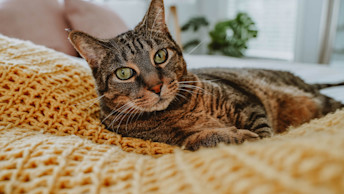November 8, 2022
Toxic Food for Cats: 10 Human Foods Cats Shouldn’t Eat

You may be tempted to share some of your favourite snacks with your cat, however, there are many human foods that are unhealthy and even dangerous for our furry friends. How do you know what foods to avoid? Keep reading to learn more!
Toxic Foods for Cats
1. Chocolate or Caffeine/Coffee
Although chocolate and coffee are often considered fan favorites when it comes to humans, these delicious treats can have detrimental effects on our pets. The caffeine and theobromine found in chocolate have similar stimulatory effects in cats, however, when absorbed by cats, can become toxic. This can lead to vomiting, diarrhea, increased thirst, restlessness, an increased heart rate, and can be fatal.

2. Grapes or Raisins
Grapes and raisins are extremely toxic to cats, and even the smallest amount ingested can lead to the rapid development of kidney failure, making this a not-so-sweet option for your pet.

3. Garlic or Onions
Ingredients within the Allium family, like garlic and onions, contain thiosulfate, which when eaten in higher amounts, is toxic to cats as it causes oxidative damage to red blood cells, resulting in hemolytic anemia.

4. Macadamia Nuts
Due to the high levels of oil and fat, this crunchy treat is not suitable for cats. Ingestion can cause lethargy, vomiting, hyperthermia, and tremors. However this is a piece of it, but the actual mechanism of toxicity is unknown.

5. Xylitol or Artificial Sweeteners
Even a small amount of artificial sweetener, specifically Xylitol, can elicit the sudden release of insulin, lowering your pet's blood sugar and potentially contributing to the onset of liver failure in your cat. It is not only sudden but 6-7x more than necessary as the body mistakes this for sugar, resulting in hypoglycemia, aka a diabetic coma, in otherwise normally healthy pets.

6. Alcohol
Alcohol suppresses your cat’s nervous system, and as a result, it is considered toxic. The smallest bit of alcohol consumed by your pet can lead to severe liver and brain damage, a comatose state, or potentially death.

7. Raw Yeast Dough
The yeast and sugar in the raw dough ferment in the stomach to produce alcohol, which once absorbed into the bloodstream can cause toxicity effects in your cat, as mentioned above.

8. Avocado
This vibrant “superfood” that we love so much is calorie-dense. Additionally, the fruit, pit, leaves, and flesh of the avocado contain persin; ingestion of which can lead to vomiting, diarrhea, and myocardial damage in cats. Even the pit of the avocado can be a choking hazard!

9. Sugary Foods/Drinks
Eating too much sugar can do the same thing to cats as it does to humans. It can cause weight gain and subsequently increase their chances of obesity. High sugar intake may cause problems with their dental health.

10. Lilies
Although lilies are not considered food cats often eat them when present. They are extremely toxic to cats and should be considered. The leaves, pollen, and flowers of a lily are poisonous to cats. Simply eating leaves or licking a few pollen grains off their fur can lead to acute kidney failure.

What to Do If Your Cat Eats One of These Foods
If you think that your cat may have eaten something toxic be on the lookout for some signs of food poisoning.
Some Common Signs to Look for Include:
- Loss of appetite
- Seizures
- Pale gums
- Drooling
- Excessive thirst
- Blood in stool
- Vomit
- Saliva
- Diarrhea
- Difficulty breathing
- Lethargy
- Weakness
It is important to remove your cat from the suspected toxin and take them to a veterinarian immediately. If you know what your pet ate to elicit the reaction, bring the ingredient label to your veterinarian for a reference. If you are unsure of what they ate, it may be useful to collect a sample of their vomit to bring to your veterinarian.
In Conclusion
The list of foods to avoid feeding your cat is long and can be scary, and a bit overwhelming for pet owners. However, there are a variety of foods made specifically for cats that provide the nutrients and taste that they need to thrive.

